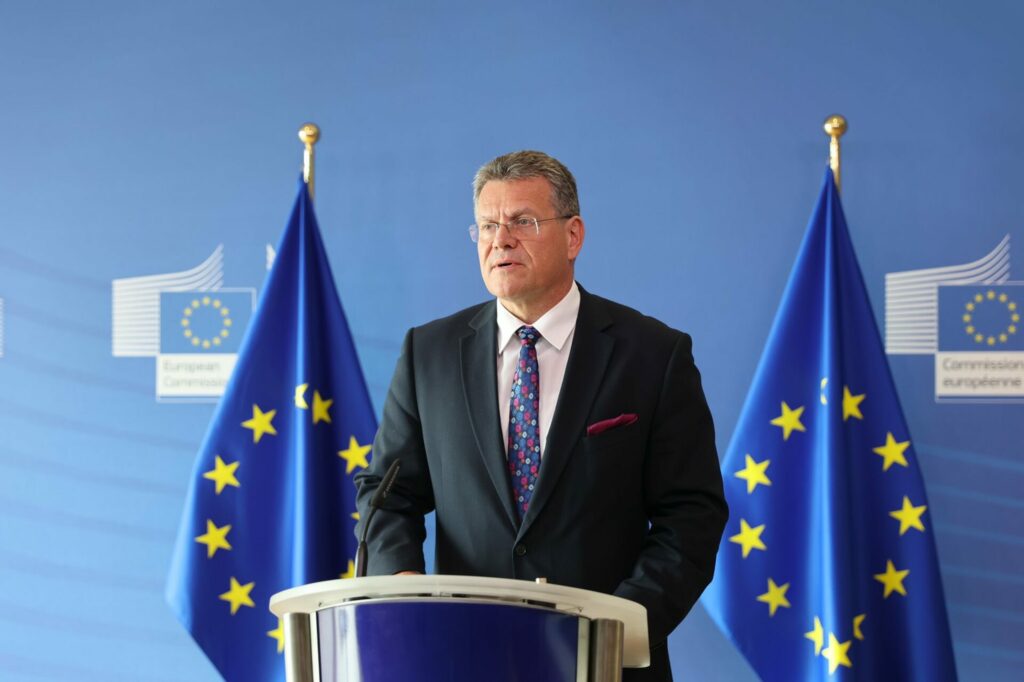The EU has responded to the UK’s unilateral plans to break the Northern Ireland Protocol in the Withdrawal Agreement, calling the move 'damaging to mutual trust'. The response comes after the UK government proposed a new legislative bill that unilaterally rewrites key aspects of the negotiated Brexit deal between the EU and the UK
In what appears to be a deliberate attempt by the UK Government to reignite a row with Brussels, the British Foreign Minister Liz Truss published the new draft legislation on Monday, outlining the UK's attempts to unilaterally rip up a key part of the Brexit deal with the EU – the Northern Ireland (NI) Protocol.
“It is with significant concern that we take note of today's decision by the UK Government to table legislation displaying core elements of the Protocol. Unilateral action is damaging to mutual trust,” stated Maroš Šefčovič, the EU Vice-President of Inter-institutional Relations and Co-Chair of EU-UK Joint Council, in an EU statement.
The Protocol contains special arrangements for the trade of goods and services going between the Republic of Ireland and Northern Ireland. It was designed to respect the constitutional position of Northern Ireland within the UK, avoid a hard border on the island of Ireland and protect the integrity of the EU Single Market.
Any move to renegotiate the Protocol was described as "unrealistic" by the EU. "No workable alternative solution has been found to this delicate, long-negotiated balance," underlined the statement.
While the current arrangements under the NI Protocol provide business operators in Northern Ireland with access to the EU Single Market, the EU has stated that the UK Government's actions have now jeopardised this, putting businesses at risk.
The EU is now looking into opening yet another legal infringement process against the UK, while also presenting alternative solutions within the framework of the agreement. "We will soon present in greater details our model for the flexible implementation of the Protocol, based on durable solutions within the Protocol."
The EU has insisted that “only joint solutions would create the legal certainty that people and businesses in Northern Ireland deserve.”
Risks of a trade war
Despite having negotiated the deal and having won an election off the back of it, the UK Government is claiming there is now "no other way" of safeguarding their essential interests except ditching key elements of the deal.
The UK Government has justified the move by claiming it threatens the Good Friday Agreement, despite leaders in Northern Ireland accusing Johnson of being the reckless one for destabilising and threatening the peace agreement.
The EU and Ireland are strongly rejecting this claim, and many including UK business representatives are warning the move risks sparking a ‘trade war’ between the UK and the EU.
The Brexit deal negotiated by both sides currently ensures custom checks for goods staying in Northern Ireland, with the transit of goods governed by EU regulations, VAT and subsidy rules. Furthermore, any disputes would be settled by the EU Court of Justice.
The new legislation now unilaterally reverses these key aspects of the Protocol, by stripping away custom checks, imposing UK regulations, UK VAT subsidy rules and providing that any disputes are to be settled by a ‘third-party’ through arbitration.
More business uncertainty
A renegotiation of the Protocol would bring further legal uncertainty for people and businesses in Northern Ireland.
The dairy industry, for example, claims the Protocol is working because companies have spent hundreds of millions of pounds adapting to the arrangements, according to Mike Johnstone of the Northern Ireland Dairy Council.
With the UK now going back on the deal, the move risks compromising the arrangement for business. If Northern Ireland milk does not meet EU standards, then it will not be able to move freely across the border.
Related News
- Flanders approves framework to support businesses impacted by Brexit
- Brexit effect: What imported products need to be declared at Eurostar terminal?
- UK PM Boris Johnson survives no-confidence vote despite huge internal rebellion
The Irish Government has responded with stern words, with Foreign Minister Simon Coveney describing the move as a "new low" in British-Irish relations over the last 25 years.
Ireland has accused the UK Government of having committed a "fundamental breach of trust," as well as calling the move illegal under international law.
Boris Johnson, who last week survived a huge internal rebellion within his party, has led his government to go back on a key principle of a negotiation conducted by two parties – trust – which also puts at risk any chance of a future trade deal.
"Today's decision by the UK government undermines the trust that is necessary for bilateral EU-UK cooperation within the framework of the Trade and Cooperation Agreement," the EU statement concluded.
The legislative bill now will have to pass both UK parliamentary chambers before being enshrined in law, and is expected to take months to pass under its current draft.

